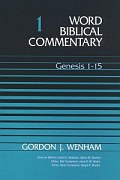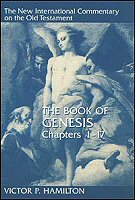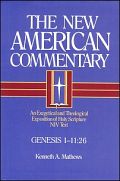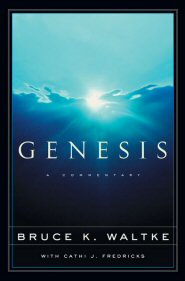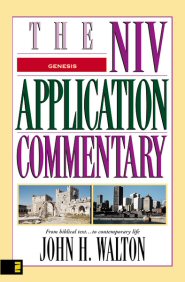Best Resources on Genesis
The book of Genesis is the beginning of the Bible. It is foundational and necessary for understanding the larger biblical canon, both Old and New Testaments. Within Hebrew Bible, Genesis belongs to the Torah (“teaching, instruction”). It is the start of a textual unit that runs through Deuteronomy and traces “history” from creation to arrival on the outskirts of the already inhabited promised land. The name of the book derives from the Greek translation in Gen 2:4a: “This is the book of the generations/origins (γενέσεως, geneseōs) of heaven and earth.” This is an title, as Genesis contains many genealogies. The Septuagint picks this up as the name of the book. The Vulgate gave it a transliterated form of the same word, and it has come identify the book. Within Jewish tradition, the book takes its title from its first word, בְּרֵאשִׁית (bereshith). This is traditionally translated as “in the beginning,” but meaning of this phrase is heavily debated—the traditional interpretation may be incorrect. Genesis is thus a book of origins and beginnings—of the entire created order, but also sin, God’s relationship with humanity, blessing and obedience, and conflict and disobedience.
—The Lexham Bible Dictionary, Lexham Press
Everything You Need to Study & Teach Genesis
Expository Preaching Kits are curated resources all focused on helping you teach a single book of the Bible—keeping you prepared without weighing you down.
Best Commentaries on Genesis
Gordon J. Wenham, Word Biblical Commentary, (WBC), Thomas Nelson, 1987–1994, 1072 pp.
Examine the compositional sources, textual witnesses, chronology, and theological significance of Genesis with Pentateuch expert Gordon J. Wenham. Review and evaluate modern critical perspectives on Genesis, and consider the legacy of nineteenth-century “higher critical” understanding of Genesis as an evolutionary document and its relationship to other ancient Near Eastern creation stories such as the Enûma Eliš. This volume contains an illuminating excursus on the significance of circumcision. Organized for easy reference, Word Biblical Commentaries make an ideal Bible study companion, whether you are studying a single passage or a complete biblical book.
- Level: Advanced
- Type: Technical
Victor P. Hamilton, New International Commentary on the Old Testament (NICOT), Eerdmans, 1990–1995, 1,273 pp.
Hamilton’s substantive introduction—which serves both this volume and the one covering chapters 18–50—discusses the structure of Genesis, its composition, its theology, the problems involved in its interpretation, its canonicity, and the Hebrew text itself. The commentary proper, based on Hamilton’s own translation, evidences his extensive knowledge of the ancient Near East and of contemporary scholarship, including literary, form, and text criticism. Siding with the arguments in favor of the literary and theological unity of the Genesis text, Hamilton stresses the main theme running throughout the book—God’s gracious promise of blessing and reconciliation in the face of evil and sin.
- Level: Intermediate
- Type: Expository
Kenneth A. Mathews, New American Commentary (NAC), B&H, 1996–2005, 1,488 pp.
Dr. Kenneth A. Matthews' two-volume commentary on the foundational book of Genesis uses the NIV text to comment on the historical and theological background of the biblical book. Based on a solid and thorough knowledge of the Hebrew text in its original linguistic and cultural context, it distinctively includes early Jewish and Christian interpretations that explore the history of the Patriarchs and addresses contemporary scholarship's interest in the compositional history of Genesis. It is particularly sensitive to the narrative nature of Genesis.
- Level: Intermediate
- Type: Expository
Bruce K. Waltke, Genesis: A Commentary, Zondervan, 2001, 656 pp.
Exploring the first book of the Bible as "theological literature," Waltke illuminates its meanings and methods for the pastor, scholar, teacher, student, and Bible-lover. Genesis strikes an unusual balance by emphasizing the theology of the Scripture text while also paying particular attention to the flow and development of the plot and literary techniques—inclusion, irony, chiasm, and concentric patterning—that shape the message of the "book of beginnings."
- Type: Expository
John H. Walton, NIV Application Commentary: Genesis (NIVAC), 2001, 768 pp.
With characteristic creativity and uncommon depth, John H. Walton demonstrates the timeless relevance of Genesis. Revealing the links between Genesis and our own times, Dr. Walton shows how this mysterious, often baffling book filled with obscure peoples and practices reveals truth to guide our twenty-first-century lives.
- Level: Intermediate
- Type: Devotional
Best Books on Genesis
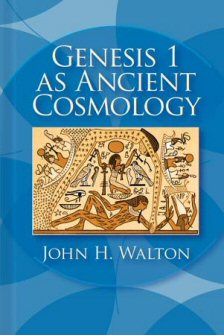
Genesis 1 as Ancient Cosmology by John H. Walton
John Walton presents comparative studies of ancient texts and their cosmologies. The first half of the book focuses on the ancient texts that inform our understanding of Near Eastern cosmology. Egyptian, Sumerian, and Akkadian texts are the primary focus, but occasionally Ugaritic and Hittite are included as appropriate. Walton posits that functional ontology was pervasive in ancient writing because bringing about order and functionality was the very essence of creative activity.
Learn more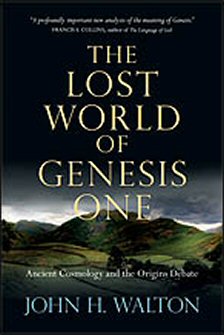
The Lost World of Genesis One: Ancient Cosmology and the Origins Debate by John H. Walton
In this astute mix of cultural critique and biblical studies, John H. Walton presents and defends twenty propositions supporting a literary and theological understanding of Genesis 1 within the context of the ancient Near Eastern world and unpacks its implications for our modern scientific understanding of origins.
Learn more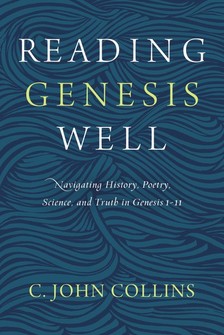
Reading Genesis Well: Navigating History, Poetry, Science, and Truth in Genesis 1–11 by C. John Collins
Old Testament scholar C. John Collins appropriates literary and linguistic insights from C. S. Lewis and builds on them using ideas from modern linguistics, such as lexical semantics, discourse analysis, and sociolinguistics. This study helps readers to evaluate to what extent it is proper to say that the Bible writers held a “primitive” picture of the world and what function their portrayal of the world and its contents had in shaping the community.
Learn more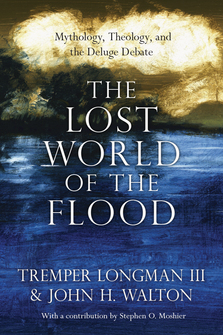
The Lost World of the Flood: Mythology, Theology, and the Deluge Debate
Longman and Walton urge us to ask what the biblical author might have been saying to his ancient audience. Our quest to rediscover the biblical flood requires that we set aside our own cultural and interpretive assumptions and visit the distant world of the ancient Near East. Responsible interpretation calls for the patient examination of the text within its ancient context of language, literature, and thought. And as we return from that lost world to our own, we will need to ask whether geological science supports the notion of flood geology.
Learn more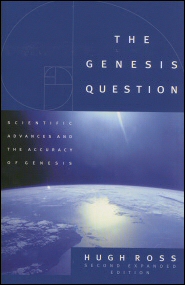
The Genesis Question by Hugh Ross
Examining recent, leading-edge scientific discoveries, Dr. Hugh Ross explores how these very chapters hold some of the strongest scientific evidence for the Bible’s supernatural accuracy. Like never before, The Genesis Question integrates the accuracy of both science and the Bible—without compromise—giving skeptics and believers common ground and opportunity for dialogue.
Learn moreBest Courses on Genesis
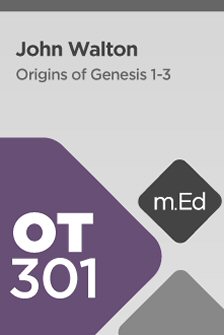
Mobile Ed: OT301 Origins of Genesis 1–3 (4 hour course)
Take an in-depth look at the first three chapters of Genesis with Old Testament expert Dr. John H. Walton. In this follow-up course to OT201, Dr. Walton focuses closely on the ancient Near Eastern context of the text, helping you see how the claims of Genesis 1–3 would have been understood by the book’s original audience. He also examines the function of the creation story and contentious issues between science and the biblical text.
Learn more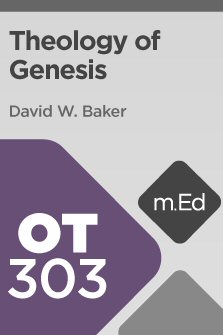
Mobile Ed: OT303 Theology of Genesis (3 hour course)
David W. Baker brings his interest in pedagogy and the Pentateuch to this Mobile Ed course on the theology of Genesis. In OT303 you will be introduced to the meaning and work of biblical theology, how it differs from systematic theology, and how to approach Scripture in a way that affects the reader for God’s glory. In addition, you'll participate in a broad study on key theological themes found in the first book of the Bible, including an in-depth look at the picture Genesis paints of God; what it means for humanity to be created in God’s image; the impact of the fall and sin on both humanity and the rest of creation; and God’s plan of restoration and redemption—all informed directly by Scripture. This practical approach to biblical theology will show you how the book of Genesis shapes discipleship today.
Learn more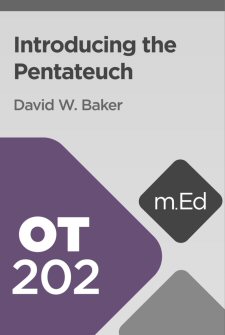
Mobile Ed: OT202 Introducing the Pentateuch (8 hour course)
In Introducing the Pentateuch, Dr. David Baker provides a broad overview of the background, structure, content, themes, and literary styles of the first five books of the Bible: Genesis, Exodus, Leviticus, Numbers, and Deuteronomy. He traces the continuous story line from creation to Israel’s arrival in the promised land with a bird’s-eye view, while exploring key stories, topics, and theological messages in greater detail along the way. Throughout the course, Dr. Baker draws out and discusses the implications of this portion of the Old Testament for the Christian’s life and ministry.
Learn more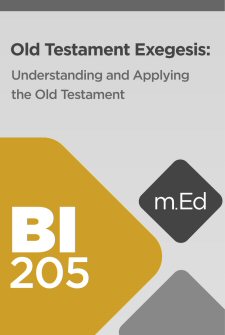
Mobile Ed: BI205 Old Testament Exegesis: Understanding and Applying the Old Testament (15 hour course)
Embark on a journey of OT Hebrew exegesis with Jason DeRouchie. The books of the OT were the only Scriptures Jesus had. It was books like Genesis and Deuteronomy, Isaiah and Psalms that shaped Jesus’ upbringing and that guided His life in ministry as the Jewish Messiah. It was these Scriptures that Jesus identified as God’s Word and that He considered to be authoritative; it was these Scriptures that He believed called people to know and believe in God and guarded them against doctrinal error and hell. This course will give you the tools you need to access meaning in the OT and then apply it to your life. It will help you to grow in reading God’s living Word for depth and not just distance.
Learn more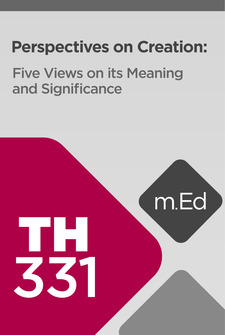
Mobile Ed: TH331 Perspectives on Creation: Five Views on Its Meaning and Significance (5 hour course)
The belief that God created the world is foundational for Christians. However, the exact nature of God’s work in creation is debated. In this course, five leading Old Testament scholars present the distinct features and biblical bases of their particular views. As they unpack the meaning and significance of the creation account, they discuss topics like hermeneutics, the genre of Genesis 1, the nature of the days in the creation week, ancient Near Eastern backgrounds and ancient cosmology, the relationship between the Bible and science, and the theological implications these various views have for the believer. This course will provide you with a better understanding of the different positions Christians hold regarding creation and will equip you to be able to explain the different issues involved in Genesis 1–2.The activities resource for this course includes additional videos by John Mark N. Reynolds and James B. Jordan, helping you reflect further on the significance of creation
Learn more